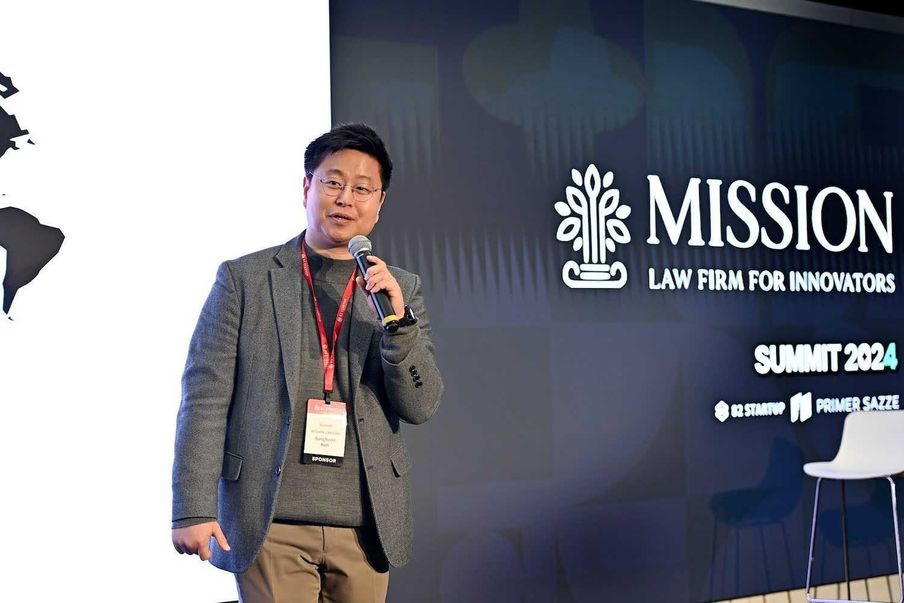'Failed entrepreneurship still deserves respect'

Seoul-based law firm Mission hopes to be a friendly neighbor for startups, navigating legal complexities in global expansion for them.
For startups and entrepreneurs, particularly those grappling with financial constraints, obtaining legal consultation from a law firm can be a daunting task. Traditional law firms are reluctant to offer comprehensive services tailored to startups as such services often may not yield significant returns.
This situation poses a significant obstacle for small yet competitive businesses aspiring to expand globally, compelling them to address legal challenges first, even before earnestly venturing into international endeavors.
In stark contrast to the traditional model, where law firms primarily engage with major corporations or governments, Seoul-based law firm Mission focuses on the creative minds of small startups and endeavors to expand its business reach beyond the domestic market.
“Mission hopes to be a true neighbor of startups who want to change the world with innovative ideas,” Seonghoon Kim, the CEO of law firm Mission said in an interview with The Miilk, adding “We’ll try to pave the way for doing cross-border businesses, minimizing delays in the process.”
On the surface, it may appear to be a typical law firm, but Mission operates like a startup on the inside. It proactively seeks solutions to problems faced by its startup clients, even if they haven't encountered those problems before. Due to its rather non-traditional business model that prioritizes providing legal services for startups over immediate profits in its initial business stage, it has been labeled as a sort of ‘maverick’ in the startup community in South Korea.

Running cross-border business is must, not option.
While numerous startups declare their dedication to global business, only a few, especially those with substantial financial resources, can effectively operate globally. This is also due to the intricacies of administrative and legal processes. Initiating operations in other countries is just one aspect of establishing a global presence. It brings forth a myriad of legal challenges spanning employment, capital exchange, and contracts. To tackle these challenges, companies resort to hiring in-house legal experts or proxy agents to address legal matters in both their home country and global markets. Typically, local law firms in each global market are engaged for assistance.
However, relying solely on law firms in both domestic and global markets is not a foolproof solution. There are inevitably gray areas that may not be adequately addressed by local or global law firms individually. Moreover, decision-makers are needed to resolve conflicting issues between different countries. For instance, US and German legal agents may offer varying perspectives on the same issue based on their respective local laws. To ensure comprehensive decision-making, Kim claims that there should be a singular entity with an efficient system capable of navigating the diverse laws across various regions.
In one case, Mission collaborated with a startup entering the US market, providing not only legal consultation but also establishing a tailored onboarding manual that includes corporate rules specific to the US business—something a typical law firm might decline to do so.
This initiative aligns with paving the ground for startups, aiding the efficient development of businesses in global markets where fledgling startups often lack government or private support. Through creating these manuals, Mission has gained valuable experience in addressing challenges unique to global markets. Leveraging these insights, Mission aims to offer comprehensive global legal services, catering not only to local startups but also to businesses entering the South Korean market. It also aims to extend its services to countries in Asia, the Middle East, and Africa.
“Mission will try to provide legal solutions for anyone and any companies looking to enter different markets,” he said.
The lawyer-turned-entrepreneur also emphasized the Korean market needs greater flexibility to appeal to global entrepreneurs. Post-pandemic, remote work has become the norm in many industries. However, labor laws often lag behind the dynamic working environment, using outdated visa rules in South Korea for nomadic workers.
“Many entrepreneurs today operate businesses in different countries, hiring employees globally. However, the current visa and tax laws sometimes pose obstacles, given that conventional legislation was primarily designed with local perspectives in mind,” the CEO explained.
In an effort to create a more favorable local business environment for global entrepreneurs, Kim actively participates in government-hosted forums and collaborates with local startup organizations, such as Startup Alliance and Asan Nanum Foundation. Together, they work to propose bills aimed at changing local business laws.
Ark, a second chance initiative
With the exception of a few, many startups worldwide are enduring a 'winter,' grappling to secure additional funding for survival. Over the past couple of years, startups have faced challenges due to a shortage of investment, attributed to high-interest rates and ongoing conflicts such as the wars between Russia and Ukraine. Recent conflicts between Israel and Palestine have further exacerbated the situation.
Kim has also witnessed the decline of numerous Korean startups in recent years due to these challenging circumstances. “Despite their failures, their entrepreneurial spirit deserves respect, and these pioneers should be given a second chance,” he stressed.
Entrepreneurs grappling with bankruptcy are often labeled as defaulters, resulting in a complete ban on all financial services for individuals. In some cases, entrepreneurs facing financial difficulties are pressured not to opt for bankruptcy but to persevere in sustaining their businesses, enduring financial losses. This is often driven by some investors who prefer not to tarnish their investment portfolios with bankruptcies. Consequently, failed entrepreneurs find themselves marginalized and pushed to the brink of exclusion.
“The market needs safety nets that can cushion failures and support failed entrepreneurs to 'rebound,'” Kim emphasized. One suggested approach is 'trust-based conditional re-investment,' which Kim refers to as 'Arc,' akin to the biblical reference. Under the Arc project, investors provide a second chance for bankrupt or near-bankrupt entrepreneurs to launch a new business in exchange for stakes in the new venture.
Kim argues that allowing a grace period is more beneficial than harmful, as the loss of entrepreneurs in the business world may impose larger social costs on society. Collaborating with Startup Alliance, he is in discussions with the Seoul City government to implement such a support program.









